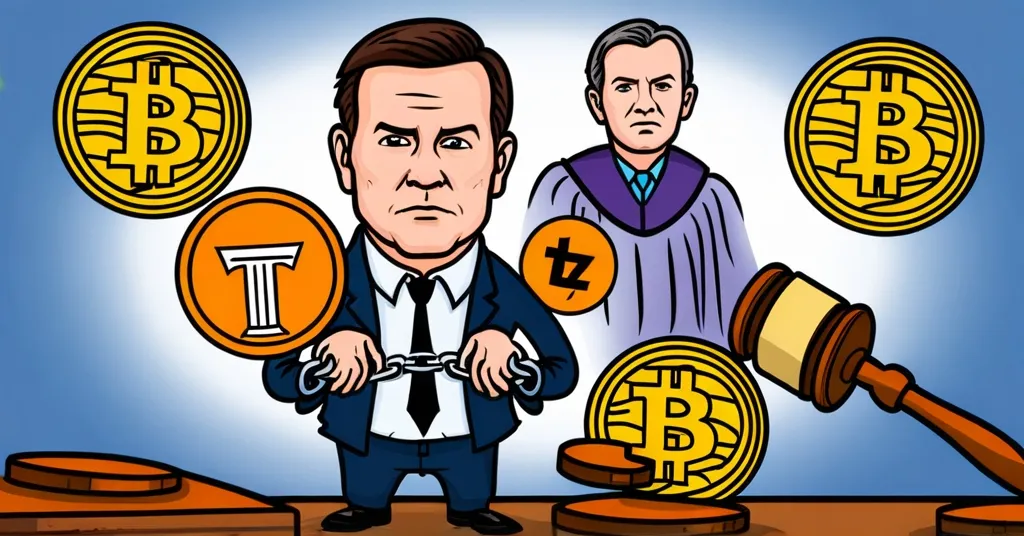Bitcoin Trader Jailed for Hiding Millions in BTC, Highlights Crypto Legal Risks

Bitcoin Trader Jailed After Hiding Millions Worth of BTC from U.K. Court
Can hiding Bitcoin land you in jail? For Graham Darby, the answer was a resounding yes. The 50-year-old British man faced a legal battle that underscores the complexities and risks of cryptocurrency disputes.
- Failed cryptocurrency transaction led to legal battle.
- Darby sentenced to 18 months for contempt, released after 146 days.
- Mental health issues and settlement reduced sentence.
- Case highlights need for transparency in crypto dealings.
Graham Darby’s saga began with a failed cryptocurrency swap. He agreed to exchange 30 Bitcoin, the first decentralized cryptocurrency, for 400,000 Tezos, a blockchain platform that supports smart contracts, with 22-year-old Australian trader Zi Wang. When the deal went south, Wang claimed Darby failed to return the Tezos, resulting in losses between £900,000 and £1.3 million—a significant sum that set the stage for a legal showdown.
Despite initial denials and missing a crucial court hearing, the digital trail led straight to Darby. Cybercrime investigator Richard Sanders, acting as a digital detective, uncovered Darby’s digital wallets, secure locations where cryptocurrencies are stored, contradicting Darby’s claim of forgotten passwords. Judge Keyser KC, unimpressed by what he described as Darby’s “head-in-the-sand approach,” sentenced him to 18 months in prison for contempt of court.
But the story didn’t end there. While imprisoned, Darby suffered a mental health breakdown and compared his ordeal to the infamous UK’s Post Office scandal, where faulty software led to wrongful convictions. His eventual apology and settlement with Wang, coupled with his mental health struggles, led to a reduced sentence. After serving 146 days, he was released—an outcome that speaks volumes about the complexities at the intersection of cryptocurrency and legal proceedings.
This case is a stark reminder of the legal minefield that cryptocurrency disputes can become. It underscores the importance of transparency and the real-world consequences of hiding digital assets. As the crypto landscape continues to evolve, cases like Darby’s highlight the need for a clear understanding and compliance with legal obligations.
And let’s not forget the human element. Darby’s mental health issues brought a poignant reminder that behind every headline, there are real people facing real challenges. The comparison to the Post Office scandal raises questions about systemic issues within the legal system, particularly when dealing with the unique nature of digital assets.
In a world where Bitcoin and other cryptocurrencies promise financial freedom and disruption, this case serves as a cautionary tale. While we champion the potential of these technologies, we must also acknowledge the pitfalls and challenges they bring. The path to a decentralized future is fraught with complexities, and stories like Darby’s are critical for understanding the full spectrum of this financial revolution.
However, it’s worth noting that the legal system is adapting to the challenges posed by digital assets. English courts have shown a willingness to use procedural tools tailored to cryptocurrency disputes, indicating a proactive approach to handling such cases. This adaptation is crucial as regulatory frameworks, like the Financial Services and Markets Act 2023, continue to evolve to better manage the cryptocurrency sector.
On the flip side, some might argue that Darby’s case is a wake-up call for the crypto community to start taking legal transparency seriously, or face the consequences. The increasing trend of cryptocurrency fraud cases underscores the need for accountability and clarity in digital asset dealings.
Despite the challenges, the potential for cryptocurrencies to revolutionize finance remains. Bitcoin, with its promise of decentralization and privacy, continues to be at the forefront of this revolution. Altcoins and platforms like Ethereum also play vital roles in filling niches that Bitcoin might not serve as effectively, contributing to the broader ecosystem of financial innovation.
Key Takeaways and Questions
- What was the nature of the cryptocurrency dispute between Graham Darby and Zi Wang?
The dispute involved a failed transaction where Darby allegedly did not return 400,000 Tezos to Wang after a swap involving 30 Bitcoin, leading to significant financial losses for Wang.
- Why was Graham Darby sentenced to prison?
Darby was sentenced to 18 months in prison for contempt of court after failing to disclose his holdings of 100 Bitcoin during the legal proceedings with Wang.
- How was Graham Darby’s sentence reduced?
Darby’s sentence was reduced to time served after he apologized, settled with Wang, and complied with court orders, with considerations given to his mental health struggles.
- What role did the cybercrime investigator play in the case?
Cybercrime investigator Richard Sanders provided expert testimony that uncovered Darby’s digital wallets, contradicting Darby’s claim of forgotten passwords and influencing the court’s decision.
- How did Graham Darby’s experience highlight broader legal system issues?
Darby compared his experience to the UK’s Post Office scandal, suggesting that his case exemplified systemic issues within the legal system, particularly in handling cryptocurrency disputes and ensuring transparency.
- What does this case suggest about the future of cryptocurrency regulation?
This case highlights the ongoing need for more robust regulatory frameworks and transparency in cryptocurrency transactions, as legal systems continue to adapt to the challenges posed by digital assets.
As we navigate the evolving world of cryptocurrency, cases like Darby’s remind us of the importance of transparency, the need for an evolving legal framework, and the human stories behind the headlines. While we celebrate the potential of Bitcoin and blockchain, we must also grapple with the challenges and ensure that the path to financial freedom is paved with integrity and understanding.



